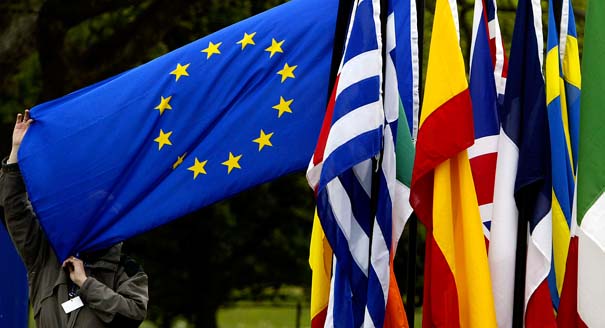The leaders of the EU’s institutions have always been selected through a Byzantine system of trade-offs between member states.
Political affiliation matters. Conservatives and socialists jostle for ideological balance, with only the odd job going to liberals or greens. Geography is important, too: there has to be a balance between candidates from large and small member states.
A minimum of experience and European conviction is required as well. You can’t become president of the European Commission if you never made it to prime minister back home.
But there is one thing that counts more than experience, background, or conviction: nationality. And this time around, as the EU prepares to choose a new Commission president, a new European Council president, and a new top diplomat next year, nationality is more important than ever.
The euro crisis has not only led to a renationalization of policies, it is also reinforcing the national outlook on matters of personnel.
Europe was given a first taste of how much the flag matters these days when the Eurogroup gathering of eurozone finance ministers needed to elect a new chair.
Northern countries, including Germany, were already highly suspicious of the fact that an Italian, Mario Draghi, leads the European Central Bank. Despite Draghi’s solid record, they instinctively suspect him of being soft on inflation and deficits because of his nationality.
Under these circumstances, the most important quality that the new Eurogroup chief needed was the right nationality. Under no circumstances could he or she be a Southerner.
The group ended up appointing Jeroen Dijsselbloem, a young and fairly inexperienced finance minister. But Dijsselbloem is Dutch, and therefore trustworthy from a German perspective.
So what does this mean for personnel choices in 2014? Let’s try to guess at the plans being hatched in national capitals right now.
Say you were German. Does that mean you would be pushing German candidates? Absolutely not. First of all, you would know that Germans aren’t very popular in Europe at the moment, and you wouldn’t want to add fuel to that fire. Second, you would be aware that Germany would have to show more willingness to compromise on EU matters if there were a German at the head of the Commission or the Council.
So, if you were German, you would be looking for candidates outside your own country, but with similar convictions. Chancellor Angela Merkel, it seems, has been trying to convince her Polish colleague Donald Tusk to stand for Commission president because she likes his free-market outlook. Tusk, the rumor goes, keeps saying that he doesn’t want to go to Brussels. In the meantime, he is taking English lessons.
What if you were from Europe’s South? From Italy, Greece, Spain, or any of the other crisis-ridden countries in the periphery?
Ironically enough, the best thing would be to get a German appointed. The same logic applies as above: it would be trickier for Germany to take a hardline stance if this meant leaving a German president of the Commission or the Council in the lurch. You would have to think hard, however, whether you would be able to sell your support for a German candidate to your domestic public.
France, under President François Hollande, has shown little leadership in Europe. So the reasoning in Paris might be in favor of a weak EU leadership. After all, a strong Commission president might want to take Paris to task over the miserable performance of the French economy and the country’s persisting public deficits. France and Germany, that’s for sure, will not be singing from the same hymn sheet over next year’s appointments.
And what about Britain? The country that in the past has generally opted for weak EU leaders who wouldn’t dare to centralize Europe any further? If you were British, you might want to rethink that attitude this time around. The reason is that the UK government has promised the British people a referendum on EU membership.
Now, as a responsible British prime minister, you know perfectly well that leaving the EU is not an economically viable option. So you urgently need to demonstrate over the next few years that your warnings have been heard, and that Europe is becoming more responsive to Britain. For that to happen, you need strong EU leaders. Best of all, of course, would be if you managed to put a British candidate into a prominent job.
This list could be continued. With different degrees of influence, all EU countries are players in the personnel game, building alliances and currying favors.
Is there any chance that the outcome of all of this backroom bartering will be good for Europe? 2014 brings a unique chance to usher in a leadership that could renew the EU after years of crisis. Yet that is not what most European governments will be thinking about.
It can still happen, but not as the result of any clear strategic thinking by national leaders. If it does occur, it’ll be due to coincidence.






